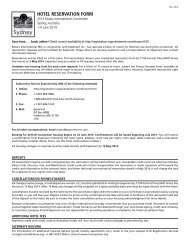로타리안을 위한 프로그램 안내서: 연구단 교환 (GSE) - Rotary ...
로타리안을 위한 프로그램 안내서: 연구단 교환 (GSE) - Rotary ...
로타리안을 위한 프로그램 안내서: 연구단 교환 (GSE) - Rotary ...
You also want an ePaper? Increase the reach of your titles
YUMPU automatically turns print PDFs into web optimized ePapers that Google loves.
Areas of Focus<br />
Partner districts have the option of basing<br />
their <strong>GSE</strong> on one or more of The <strong>Rotary</strong><br />
Foundation’s six areas of focus:<br />
• Maternal and child health<br />
• Water and sanitation<br />
• Disease prevention and treatment<br />
• Basic education and literacy<br />
• Economic and community development<br />
• Peace and conflict prevention/resolution<br />
If both districts agree to this arrangement,<br />
then they should discuss how they wish to<br />
incorporate the selected area(s) of focus into<br />
the host itinerary.<br />
Suggestions from Former<br />
<strong>GSE</strong> Participants<br />
• Put team members together with hosts of<br />
the same profession, hobbies, or interests.<br />
• Expose the team to people in the same<br />
age groups as the team members.<br />
• Limit the number of areas team members<br />
visit so they can absorb life in your country<br />
without rushing from place to place.<br />
• Plan reasonable workdays — not 12- to<br />
15-hour days.<br />
• Overlap the exchange with the outbound<br />
<strong>GSE</strong> team so that team members from<br />
both partner districts have some one-onone<br />
time in both countries.<br />
• Allow time to meet with <strong>Rotary</strong> Youth<br />
Exchange students, <strong>Rotary</strong> Scholars, and<br />
<strong>Rotary</strong> Peace Fellows while in the host<br />
district.<br />
• Create more interaction with young people,<br />
especially college and high school students.<br />
• Share profiles on the <strong>Rotary</strong> host families<br />
and provide photos.<br />
• Include more vocational days.<br />
• Include more time to join in the day-today<br />
life of hosts, possibly during <strong>Rotary</strong><br />
projects.<br />
• Provide an orientation and training for<br />
host families.<br />
• Make sure that host districts schedule sufficient<br />
presentation time at <strong>Rotary</strong> dinner<br />
meetings.<br />
Tips for Host Families<br />
Effective host families will:<br />
Welcome the team member. If possible, one<br />
or more family members should be among<br />
the welcoming delegation that meets the<br />
<strong>GSE</strong> team upon arrival in the host district.<br />
Families should introduce themselves to the<br />
team member(s) assigned to them and assure<br />
that they are looking forward to the visit.<br />
Share their home and lifestyle. While the<br />
team member is living in local homes, the<br />
daily routine should be disrupted as little<br />
as possible. Host families are encouraged to<br />
share their culture as it exists in everyday life.<br />
This does not mean hosting elaborate parties<br />
and entertainment but allowing the guest to<br />
participate in daily family activities, religious<br />
pursuits, community involvement, etc.<br />
Be aware of language factors. Preparation<br />
and communication are key to the success of<br />
any <strong>GSE</strong>. District governors are encouraged<br />
to appoint a team leader who is proficient in<br />
the language.<br />
If families have difficulty communicating<br />
with their guest, they should speak very<br />
slowly, pronounce each word distinctly, and<br />
avoid using colloquialisms. Occasionally, it<br />
may be necessary to seek help from someone<br />
fluent in the guest’s native language: the <strong>GSE</strong><br />
team leader, a teacher, or a translator assigned<br />
by the host district’s <strong>GSE</strong> subcommittee to<br />
provide this service, or perhaps a visitor from<br />
the guest’s home country.<br />
Provide for meals and laundry. Unless<br />
otherwise stated in the team’s itinerary, team<br />
members are usually not with their host<br />
families for lunch. Before the team member<br />
arrives, determine if he or she adheres to any<br />
dietary restrictions.<br />
When the Visiting Team Arrives<br />
The Briefing Meeting<br />
• Brief the visiting team immediately after<br />
it arrives in the host district, allowing<br />
some rest time for jet lag recovery. The<br />
session should include a review of the<br />
itinerary and an opportunity for team<br />
members to ask questions, make special<br />
requests, and discuss their expectations of<br />
the visit.<br />
12 | GROUP STUDY EXCHANGE


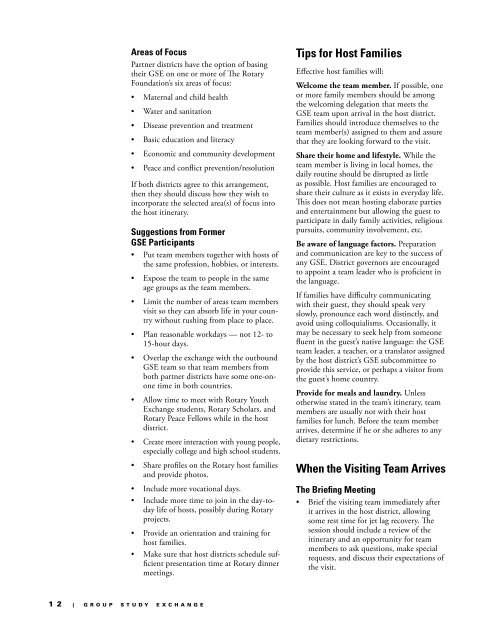
![La présidence du club [222-FR] - Rotary International](https://img.yumpu.com/25855726/1/190x245/la-presidence-du-club-222-fr-rotary-international.jpg?quality=85)

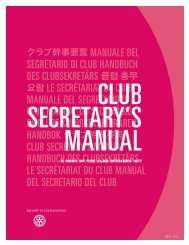
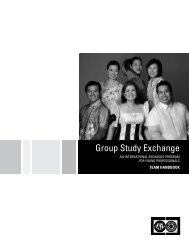
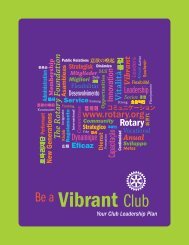
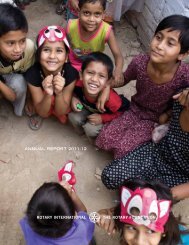

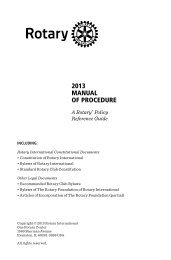

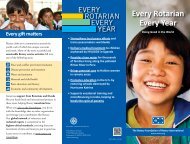
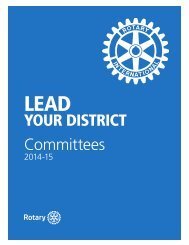
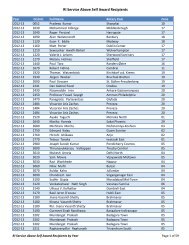
![La conférence de district [800-FR] - Rotary International](https://img.yumpu.com/25855636/1/190x245/la-conference-de-district-800-fr-rotary-international.jpg?quality=85)
